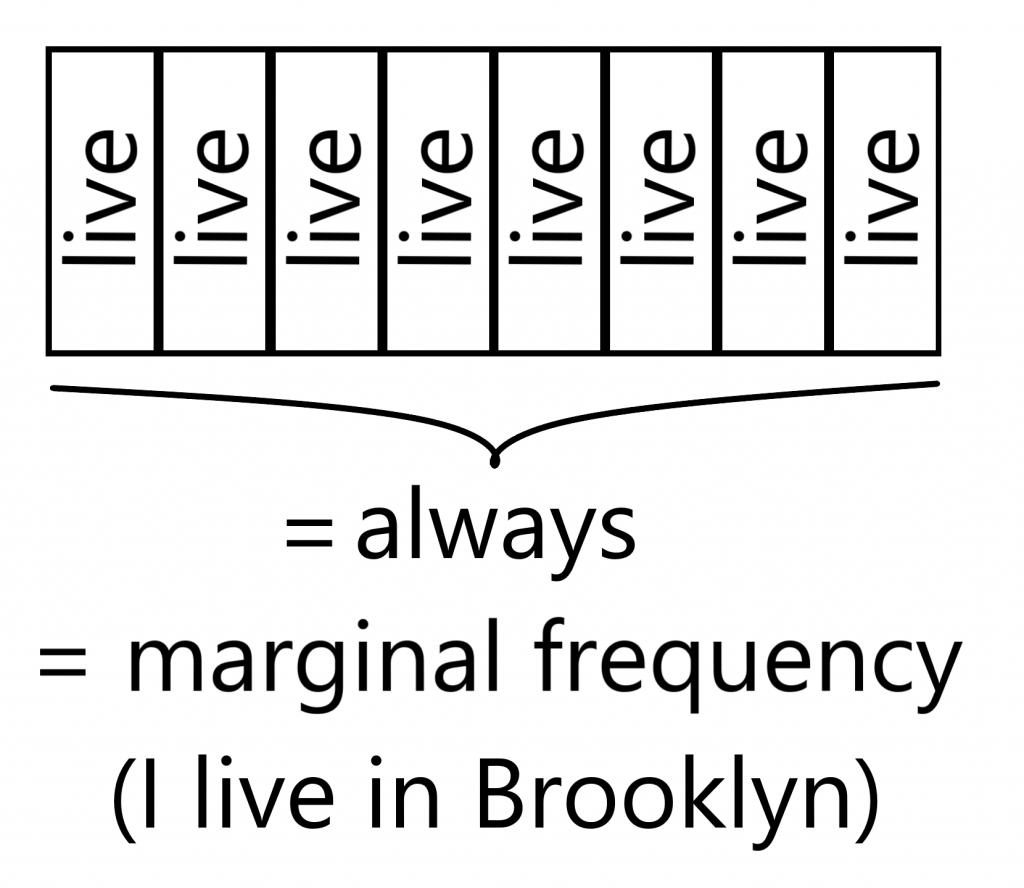Unchanging (permanent) situations must be in the present time in order to qualify for this particular use of the Present Simple Tense.
Time period between 2 actions in a series of actions is minimized to zero
Case 1
Firstly, imagine a situation or action that takes place in the present and periodically, regularly. There will be some time interval between each of these actions in a series. This interval can be more or less equal:
every 2 days, every 56 seconds, at 5 pm every day, every day etc.
Case 2
Secondly, It might have some unknown time interval. For instance:
sometimes (on certain occasions, in certain circumstances)
from time to time
occasionally (now and then, once in a while, less often than sometimes, more often than rarely)
often
rarely
The main idea, in both cases here, is that these actions or events repeat. It creates some sort of pattern. This pattern reminds me of a chain link that repeats and eventually creates the whole chain.
Case 3
Thirdly, and most importantly, let’s imagine a situation where:
Case 3 A
– a time period between actions is minimized to zero.
As a result, all sub-actions become one permanent, unchanging, solid action. In this situation, the zero period of time, I mentioned, will be called marginal frequency. Marginal frequency signal words are always, permanently, all the time etc.
She always goes to work by bus.

Case 3 B
Marginal frequency in the negative meaning is never (positive sentences), ever (negative sentences) etc.
She never goes to work by bus.
She doesn’t ever go to work by bus.
Marginally infrequently = marginal frequency in the negative meaning = never.
Good link on this:
meaning – I don’t ever go / I never go – English Language Learners Stack Exchange
In this situation, the time period between 2 events or actions is maximized to infinity (maximum). An action or event never takes place. We would call it inverted marginal frequency with a signal word: never.
She never goes to work by bus.
General realities, general truths, world truths, and facts are basically more or less unchanging (permanent) situations. All of them also fall into the category of marginal frequencies. So, why do we have such a separate section as unchanging (permanent) situations?
I think that’s because general realities (general truths, world truths) are the result or effect of scientific formula or process.
Comparison between general realities, unchanging situations, and facts:
General realities / truths, world truths as unchanging (permanent) situations
General realities / truths, world truths in the positive form
Signal word – always
Marginal frequency
Publicly known fact
Regularity, formula based
scientific cause-effect
Two plus two (always) makes four. Water freezes at zero degrees.
General realities / truths, world truths in the negative form
Signal word – never
Marginal frequency
Publicly known fact
Regularity, formula based, scientific cause-effect
Two plus two doesn’t make five. = Two plus two never makes five.
All things considered, we put this sentence into General realities / truths, world truths category.
Unchanging (permanent) situations as facts
Stating Facts in the positive form
Signal word – always
Marginal frequency
Publicly known fact
Not regularity, not formula based, not scientific cause-effect
Computers use binary – the digits 0 and 1 – to store data. London is the capital of England and the United Kingdom.
The speaker may be mistaken about the facts, the important part is that they believe it’s a true fact, or pretend to believe.
As a result of my observations, I put such sentences into Stating Facts category.
Unchanging situations (studied separately)
Unchanging situation in the positive form
Signal word – always
Marginal frequency
Not a publicly known fact
Not regularity, not formula based, not scientific cause-effect
He (always) lives in London.
Unchanging situation in the negative form
Signal word – never
Marginal frequency
Not a publicly known fact
Not regularity, not formula based, not scientific cause-effect
He doesn’t live in London. = He never stays in London.
In conclusion
So, I have done this research on my own. I don’t think anybody has made such research on the difference between these 3.
More on Present Simple:
To work on:
simplify and put it all in a table

Very useful